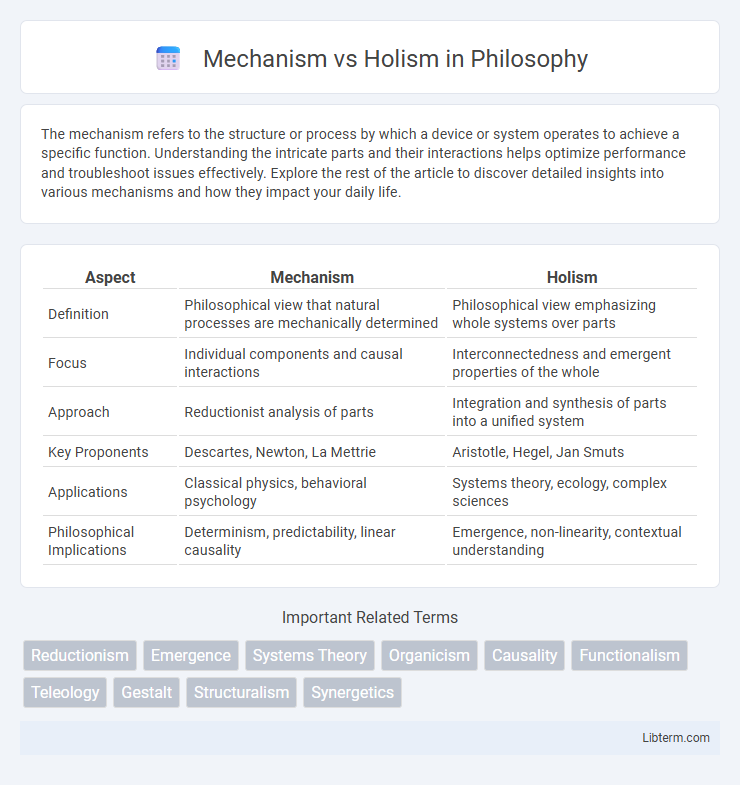The mechanism refers to the structure or process by which a device or system operates to achieve a specific function. Understanding the intricate parts and their interactions helps optimize performance and troubleshoot issues effectively. Explore the rest of the article to discover detailed insights into various mechanisms and how they impact your daily life.
Table of Comparison
| Aspect | Mechanism | Holism |
|---|---|---|
| Definition | Philosophical view that natural processes are mechanically determined | Philosophical view emphasizing whole systems over parts |
| Focus | Individual components and causal interactions | Interconnectedness and emergent properties of the whole |
| Approach | Reductionist analysis of parts | Integration and synthesis of parts into a unified system |
| Key Proponents | Descartes, Newton, La Mettrie | Aristotle, Hegel, Jan Smuts |
| Applications | Classical physics, behavioral psychology | Systems theory, ecology, complex sciences |
| Philosophical Implications | Determinism, predictability, linear causality | Emergence, non-linearity, contextual understanding |
Understanding Mechanism: Core Principles
Understanding mechanism involves analyzing systems by breaking them down into their fundamental parts and examining how these components interact to produce complex outcomes. Core principles include reductionism, causality, and functional relationships, which emphasize a linear and deterministic approach to explaining phenomena. This method contrasts with holistic perspectives by focusing on isolated elements rather than the emergent properties of the entire system.
Exploring Holism: Foundational Concepts
Holism asserts that systems and their properties must be analyzed as wholes, not merely as collections of parts, emphasizing the interconnectedness inherent in biological, ecological, and social phenomena. This perspective contrasts with mechanism, which reduces complex systems to individual components and their interactions. Foundational concepts of holism include emergence, where new properties arise that cannot be predicted from individual elements, and the principle of systemic integration, highlighting that the behavior of whole systems shapes constituent parts.
Historical Development of Mechanism and Holism
Mechanism emerged in the 17th century as a dominant framework in science, influenced by figures such as Rene Descartes and Isaac Newton who emphasized the universe as a machine governed by physical laws. Holism gained prominence in the 20th century as a reaction against reductionism, advocating that systems must be understood as integrated wholes rather than merely the sum of parts, with key contributions from thinkers like Jan Smuts and Ludwig von Bertalanffy. Both perspectives have shaped disciplines ranging from biology to philosophy, reflecting evolving views on complexity and the nature of scientific explanation.
Key Differences Between Mechanism and Holism
Mechanism explains phenomena by breaking them down into their smallest parts and analyzing the interactions between these components, often emphasizing cause-and-effect relationships. Holism, in contrast, views systems as integrated wholes where the properties and behaviors emerge from the complex interactions among parts, not reducible to individual elements alone. Key differences include mechanism's reductionist approach versus holism's emphasis on system-wide interdependence and emergent properties.
Advantages of Mechanistic Approaches
Mechanistic approaches provide clear, precise explanations by breaking down complex systems into individual components and their interactions, facilitating detailed analysis and predictability. These approaches enable replicability and control in scientific experiments, leading to consistent results and advancements in fields such as biology, engineering, and medicine. The reductionist nature of mechanistic methods aids in identifying causal relationships and designing targeted interventions or innovations.
Strengths of Holistic Perspectives
Holistic perspectives emphasize the interconnectedness of systems, allowing for a comprehensive understanding of complex phenomena by considering multiple variables and their relationships simultaneously. This approach uncovers emergent properties that mechanistic views may overlook, offering a richer insight into dynamic processes in fields such as ecology, psychology, and sociology. Holism's strength lies in its ability to integrate qualitative and quantitative data, fostering more effective problem-solving and decision-making in complex, real-world contexts.
Mechanism in Scientific Research and Analysis
Mechanism in scientific research emphasizes understanding systems by breaking them down into their individual components and examining the interactions at a detailed, often molecular or cellular, level. This approach enables precise control and prediction of phenomena by identifying causal relationships between parts within complex systems. Mechanistic analysis is fundamental in fields such as biology, chemistry, and physics, where experimental manipulation and modeling of discrete elements provide clear insights into underlying processes.
Holism in Health, Psychology, and Ecology
Holism in health emphasizes treating the whole person, integrating physical, mental, and emotional aspects to promote overall well-being rather than addressing symptoms in isolation. In psychology, holistic approaches consider the interplay of cognitive, emotional, social, and environmental factors, fostering comprehensive therapeutic strategies that enhance mental health outcomes. Ecologically, holism underscores the interconnectedness of ecosystems, recognizing that the health of individual species and environments depends on the balance and relationships within the entire system.
Integrative Approaches: Bridging Mechanism and Holism
Integrative approaches in philosophy and science combine mechanism's focus on analyzing parts with holism's emphasis on whole-system interactions to provide a comprehensive understanding of complex phenomena. These methods leverage systems theory and emergent properties to explain how individual components interact within larger networks, enhancing predictive accuracy and explanatory power. Bridging mechanism and holism facilitates interdisciplinary research, supporting advancements in fields like biology, cognitive science, and environmental studies by addressing both micro-level mechanisms and macro-level systemic patterns.
Future Directions: Mechanism vs. Holism in Modern Thought
Future directions in the debate between mechanism and holism emphasize integrating systemic complexity with analytical precision, leveraging advances in artificial intelligence and systems biology to model interactions beyond reductionist frameworks. Emerging interdisciplinary approaches prioritize holistic data synthesis while maintaining mechanistic insights to address multifaceted challenges in ecology, medicine, and social sciences. This synthesis fosters nuanced understanding of dynamic systems, promoting adaptive solutions that reflect both component-specific functions and emergent properties.
Mechanism Infographic

 libterm.com
libterm.com